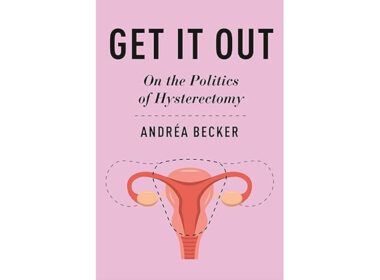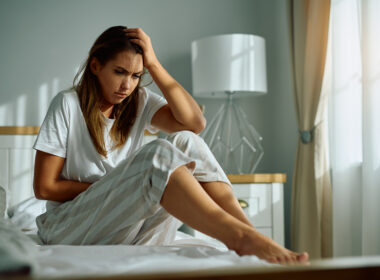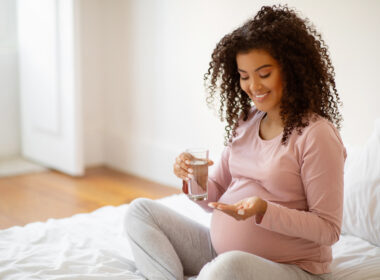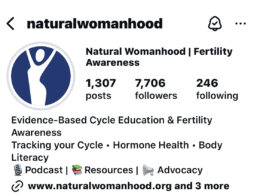As I grew up, my mother imparted many life lessons to me. She taught me to wipe the baseboards, which sneakily gathered dust as they evaded the broom. She instructed me to look for the tag on the fitted sheet, which awaited its proper place in the left bottom corner of the mattress. She reminded me to ask guests if they wanted a beverage, which welcomed them into our home. My mother’s guidance refined me into a more conscientious person, and I’m sure many others have had similar experiences. Mothers prepare their children for the world. However, many have neglected an important series of lessons—those that teach their daughters about their own bodies.
Many girls grow up without knowing about their cycles
Few women understand their bodies, or, at least, I have reached this conclusion after conversing with friends about women’s physiology. The cyclic rising and falling of estrogen and progesterone never entered any dialogue during adolescence, and now, as young adults, they cannot discern between normal and irregular physical and emotional changes. Consequently, too many women suffer from hormonal imbalances, consume unnecessary medications, and live an overall lower quality of life. Contraceptive use masks many symptoms as women take it, often at the recommendation of their healthcare professionals, as a cure-all from acne to painful cycles. In fact, according to the CDC, 14% of all women ages 15-49 take the Pill (65.3% of this population uses some form of contraception). These numbers total an astounding 10.5 million women who daily suppress their cycles with the Pill.
The cyclic rising and falling of progesterone never entered any dialogue during adolescence, and now, as young adults, they cannot discern between normal and irregular physical and emotional changes. Consequently, too many women suffer from hormonal imbalances, consume unnecessary medications, and live an overall lower quality of life.
Many women do not know that simple dietary lifestyle habits, incorporated supplements, and a general awareness of a woman’s hormonal cycle can improve cystic acne, lower mood, reduced energy, and a whole host of other symptoms. No one told them about their bodies, much less how to care for them.
Their educators have failed them
Many parents have relied upon the sexual health courses offered by schools to educate their vulnerable pre-adolescents and adolescents. Parents perhaps intend for girls to learn about menstrual health in these courses, but only a few states require this topic in detail. For example, according to a 2022 audit of the Department of Education websites of all 50 US states, only Michigan, California, and New Jersey touched upon menstrual products, and only Utah, Oregon, and Michigan incorporated “menstruation management” in their curriculum [1]. More broadly, many states do not even offer such sexual health courses at pre-adolescent years when girls often begin menstruation; for instance, only 21% of elementary schools nationally offer puberty education [2]. In general, only 30 states require sexual health courses be taught in public schools. Even when schools offer such classes, a primary focus revolves around sexually transmitted diseases, pregnancy prevention, and informed consent, not understanding the cycle as a sign of health.
For example, according to a 2022 audit of the Department of Education websites of all 50 US states, only Michigan, California, and New Jersey touched upon menstrual products, and only Utah, Oregon, and Michigan incorporated “menstruation management” in their curriculum
Generally, girls still choose their mother as their primary educator on these topics, but studies report that these conversations do not always occur in the home [3]. Both parents often feel uncomfortable engaging in these conversations, which recently declined in number [3,4]. Additionally, mothers may feel apprehensive or unqualified for such discussions perhaps because they do not know their own bodies, they lack a relationship strong enough to discuss a sensitive or personal topic, or they follow society’s lead in deeming the topic taboo. All that said, mothers have not completely abandoned communicating sexual health topics, though the exact depth and focus of these conversations vary widely [4].
Unfortunately, girls often feel unprepared for the onset of menstruation as well as the complexity of their cycle. Admittedly, the pill and other forms of contraception have made this lack of knowledge easy. For instance, many women often comment how they enjoy the predictability of bleeding every 28 days, even though this imitated cycle only simulates a woman’s true cycle.
Now is the time to change
A woman understanding her body will help her, regardless of whether she wants children now or in the future. Birth control should not be a panacea for all reproductive health related issues. Instead, working toward a regular, relatively pain-free cycle supports overall health. Educating women to know exactly what to expect, how to chart, and what symptoms deviate from the norm helps them live higher qualities of life.
Education begins with women guiding women
Conversations about women’s health require comfortable spaces. Intergenerational perspectives foster a broader understanding of health. These areas to educate other women need to be built in a familiar, unstigmatized manner. Grandmothers, aunts, friends, sisters, daughters, and mothers all in one room can foster such discussions. A JAMA Pediatrics review on parent-based interventions discovered that youth delayed sexual activity and understood their sexual health to a greater extent when their parents were involved [5]. A supportive community could bolster this education even more.
A JAMA Pediatrics review on parent-based interventions discovered that youth delayed sexual activity and understood their sexual health to a greater extent when their parents were involved [5]. A supportive community could bolster this education even more.
Why moms need to talk to their daughters about their cycles
First, each woman has a unique body. She shares the same physiology, the same endocrine system, and so on with other women, but her experiences are her own. From a metadata analysis of over 600,000 cycles, significant variations found in phase length and ovulation timing indicated each woman’s cycle is incredibly individualized [6]. As an example, perhaps one woman has terrible cramping during her cycle, but another has only light bleeds. If many women share their own stories with them, one girl can begin to recognize these terrible cramps are abnormal, and the other girl can understand that light bleeds may indicate she has hormonal imbalances. They can recognize the spectrum from normal to abnormal and can learn how to address the deviations (with help from medical professionals as needed) from the norm.
Second, girls often rely on mothers for information, but during adolescence, girls’ willingness to confide in their mothers typically declines. Both mothers who want to teach their daughters and daughters who want to learn can benefit from other close female adult figures supporting the daughters’ education, particularly when the mother-daughter relationships face uncertain tension. I have witnessed the fruitfulness of friends’ close-knit communities of relatives and friends as they supported and educated each other through female health-related illnesses and shared their personal journeys of infertility and of pregnancy.
Third, girls now open a ChapGPT session or search on Reddit or another social media platform for information. Online voices offer conflicting opinions on women’s menstrual health; for example, some decry the Pill while others promote it, causing confusion. Mothers and their supporting communities can guide their daughters because they care about them and know them personally, tailoring their conversations best to their daughters’ needs. (And if you want support as you open these conversations with your daughter, Natural Womanhood’s Period Genius program is a fantastic resource.)
Women can support each other by fostering open conversations
Women who know their own bodies are poised to help other women, both with peers and with those in their care. Among peers, they can reverse societal taboos about female anatomy and physiology by making such conversations commonplace. For instance, numerous friends have shared their birth stories with me, and though not a mother myself yet, I know from these interactions to practice pelvic floor exercises during pregnancy, to eat a nutritious diet and take certain supplements during pregnancy, and to write out a birth plan for the hospital staff or midwives. I have learned that some women experience ovulation pain, other women crave foods during their luteal phase, and still others’ pain led them to discover an underlying pathology. Conversing educated me; it has the potential to educate others.
Women who know their own bodies are poised to help other women, both with peers and with those in their care. Among peers, they can reverse societal taboos about female anatomy and physiology by making such conversations commonplace.
Women can pass similar stories down to the daughters, nieces, cousins, and other youth in their care. Girls beginning menstruation rarely know what to expect, and such communication can help them realize that debilitating cramps may indicate an underlying pathology, irregular periods may indicate a luteal phase deficiency, among other irregularities. They can then share how to reverse these symptoms without taking hormonal birth control.
Among cleaning, bedmaking, and hosting, women’s health needs to be added to the topics a girl learns as she grows up. Natural Womanhood’s Cycle Mindfulness Clubs on university campuses serve as great teachers, but that education should not start and stop at this stage in life. Women need other women. Bridal showers or baby showers, coffee chats or book clubs, baking expeditions in the kitchen or walks through the neighborhood—all these spaces offer the opportunity to give this gift to others.
Among cleaning, bedmaking, and hosting, women’s health needs to be added to the topics a girl learns as she grows up. Natural Womanhood’s Cycle Mindfulness Clubs on university campuses serve as great teachers, but that education should not start and stop at this stage in life. Women need other women.











